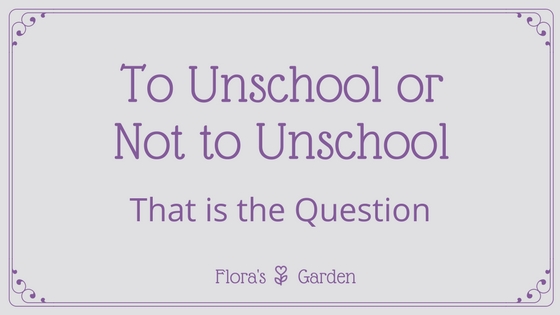I have recently come across several questions about Unschooling on various discussion forums and groups. This got me thinking about it again and I thought I would weigh in with my take on the method.
First a Definition. There are as many definitions as there are people doing it. Unschooling is very misunderstood. Consequentially many people will argue for or against it without bothering to figure out how the other individual is defining it. Thus I have seen arguments wherein the participants might actually be arguing the same point and not even realize it.
It seems as though there are as many definitions as there are people doing it making “unschooling” hard to pinpoint. People might argue for or against it without bothering to figure out how the other individual is defining it. Thus I have seen arguments wherein the participants might actually be arguing the same point and not even realize it.
So here is Wikipedia’s definition
Unschooling is an educational method and philosophy that advocates learner-chosen activities as a primary means for learning. Unschooling students learn through their natural life experiences including play, household responsibilities, personal interests and curiosity, internships and work experience, travel, books, elective classes, family, mentors, and social interaction. Unschooling encourages exploration of activities initiated by the children themselves, believing that the more personal learning is, the more meaningful, well-understood and therefore useful it is to the child. While courses may occasionally be taken, unschooling questions the usefulness of standard curricula, conventional grading methods, and other features of traditional schooling in the education of each unique child.
Now for a visual as to what this can actually look like, here is a real life example. In this post, a father shares the beauty and vision of an Unschooling home and family. I love its message and result.
To me, this sounds FABULOUS!!!
Early in my homeschooling experience I was greatly influenced by the writings of John Holt now referred to as the “father of unschooling.” I soon read Oliver DeMille who has a similar ring. I loved the idealism. I was enamored by the vision of children busily working and keeping busy with never ending a-ha moments and epiphanies. It was beautiful.
This is definitely what I wanted in my home.
I scoffed at textbooks and closely defined schedules. I decided that I didn’t need schedules or curriculum. I liked the flexibility and freedom.
Translate that as: I was lazy and lacked self-discipline. I wanted to do it my way. I knew better. I didn’t need to spend the time to develop habits for my morning routines let alone school days. I wanted to live, parent, teach by the seat of my pants.
This philosophy may have been just fine if I had stuck with having one or two children. I could easily talor our learning to what my son needed and all was beautiful.
But as my family continued to grow and their interests and needs grew, my lack of structure became ever more visible. My world became chaotic and I became stressed believing that once he realized he needed math (for example) he would learn it. However, at about the age of 11, I realized that instead of his learning his math facts, he just avoided all situations in which he would need them. Worse than that, the message he was internalizing was that he was dumb because he didn’t know it.
Yet, I know Unschooling can work. I have seen it. So what was I doing wrong?
I was not really prepared to do unschool. I had a vision, but I did not have all of the skills in place to be successful at it.
Once again, I was driven to my knees in prayer to find out what I needed to do for my family. And, once again, I was blessed with new knowledge and guidance that I needed and was able to recover and learn. I mourned the loss of my perfect vision, and I changed course.
So what did I learn?
- I do not regret my experiment. I learned a great deal about me and my children.
- I learned (again) to trust that the Lord knew what we needed. (I think we needed that experiment, and then we needed to end it.) And that He would guide me.
- I learned what it took to do unschooling correctly.
- I learned to be ok with adapting to the needs of my family.
- I learned that Each family could be guided differently and it was ok. There is not necessarily a ONE right answer for everyone.
I believe that true unschooling can work under the right circumstances. However it Unschooling needs some Key components.
- Parents need to be in agreement about what they want. They must have a shared vision.
- They really need a solid educationally focused family culture where the kids can see both parents actively engaged in learning and pursuing their own educational interests.
- The environment needs to have structure and accountability in order support the fluidity of educational content itself.
Unschooling can work. Remember that story I shared with you at the beginning? Theirs is a beautiful illustration of making a functioning Unschooling environment with the needed ingredients.
- Both parents were involved
- Both parents shared a vision of what they wanted for their children
- Both parents provided the example of learning
- The home environment was conducive to the natural learning that occurs.
And an unofficial 5. They had only two children which would make it a whole lot easier to cater to the educational whims of childhood. With my 5 children (with special needs thrown in the mix just to make it fun) I was never able to keep up: too disorganized.
There is a danger in Unschooling. Too often, in the attempt to “unschool” parents will go to the extreme of not giving any expectations or boundaries which could morph into what I would call “unparenting.” for example, letting the child eat when and what he wants to eat whenever and brushing teeth only when he wants to.
As shown in this video
But, ya know? Part of me even wants to say that this can work with the right personalities involved. But I no longer feel comfortable with an all-out endorsement.
That is not to say that children can not be encouraged to pursue their own interests. They could and should, and homeschooling is perfect for allowing the time and opportunities to do so. (like being able to get “school” done in the morning so that they have the afternoon free to pursue those interests.)
Yet, young children crave structure and boundaries in order to feel safe. Unschooling or not, these boundaries are important. (I am still learning how to be consistent with this one.)
Children generally lack the life experience to intuitively know what to study simply because they do not yet know their options. Charlotte Mason (a teacher of teachers who taught 100-150 years ago) was fabulous about guiding gently, yet providing a rich and broad education of quality materials. This broad quality education provided opportunites to be exposed to many different subjects that might spark interest in children.
You can cater to you children’s strengths and learning styles while building your family culture and family relationships. Though you can go overboard in this too, and end up switching around curricula so often you lose any sense of cohesiveness. But that will need to wait for another post.
situs gacor hari ini


0 Comments